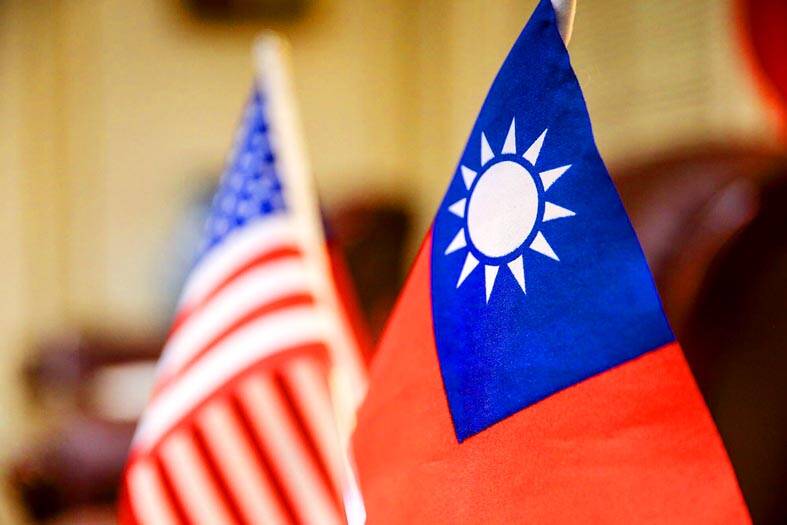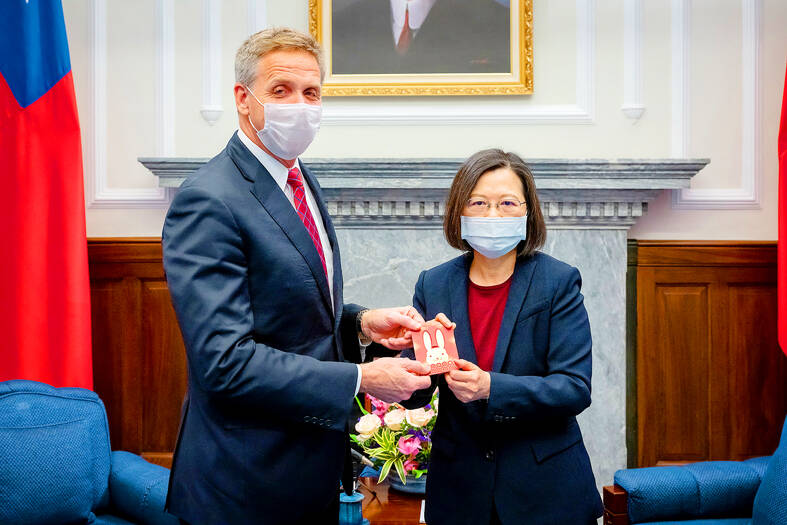If influence in the Indo-Pacific region is one of the US’ core interests, then Taiwan serves as a cornerstone of US economic and security influence in the region, former US Indo-Pacific Command commander admiral Phillip Davidson said on Thursday.
“China’s ... strategy is to supplant the US leadership role in the international order ... and they’ve long said ... that they intend to do that by 2050,” Davidson told the National Review Institute’s Ideas Summit in Washington.
Davidson said he had previously told US Senate hearings on China’s military activities and possible threats in the Indo-Pacific region that a Chinese invasion of Taiwan could happen within the next 10 years, or even the next six years.

Photo: Cheng I-hwa, Bloomberg
That timeline should not be taken as a definitive plan for China to attack, but rather a timeframe in which China would use economic, diplomatic and military means to weaken the US, and create the impression that China is on the rise while the US is in decline, Davidson said.
China has clearly stated its intent to prioritize “internal” security issues, which includes Taiwan, Davidson said, adding that in light of such statements, the US needs stronger deterrents against China.
Taiwan is a core interest for China, and the US’ regional allies are accustomed to gauging US policy reliability based on the Taiwan Relations Act and long-standing US-Taiwan relations, Davidson said.

Photo: EPA-EFE / Makoto Lin / Presidential Office
While the US should reinforce its relations with partners and allies, which includes assisting Taiwan, Taiwan must invest in strengthening its defenses as well, Davidson said.
Elbridge Colby, nominee for US undersecretary of defense for policy, on March 5 said that Taiwan’s defense spending was insufficient and should come closer to 10 percent of GDP.
Davidson also said that in addition to developing asymmetrical combat capabilities, Taiwan’s traditional combat capabilities also need work, citing how Taiwan needs more traditional weapons platforms, including planes, ships and submarines, to counteract Chinese People’s Liberation Army (PLA) harassment.
The PLA frequently sends its jets and planes into the Taiwanese air defense identification zone, flies past the median line of the Taiwan Strait and sails ships around Taiwan, he said.
Asked what were the possible results of Taiwan becoming a part of China, Davidson speculated that Japan and South Korea would contemplate developing their own nuclear umbrella to safeguard their regional interests, challenging the US stance on nuclear proliferation and possibly destabilizing the US-led Asia-Pacific security architecture.

CHAOS: Iranians took to the streets playing celebratory music after reports of Khamenei’s death on Saturday, while mourners also gathered in Tehran yesterday Iranian Supreme Leader Ayatollah Ali Khamenei was killed in a major attack on Iran launched by Israel and the US, throwing the future of the Islamic republic into doubt and raising the risk of regional instability. Iranian state television and the state-run IRNA news agency announced the 86-year-old’s death early yesterday. US President Donald Trump said it gave Iranians their “greatest chance” to “take back” their country. The announcements came after a joint US and Israeli aerial bombardment that targeted Iranian military and governmental sites. Trump said the “heavy and pinpoint bombing” would continue through the week or as long

TRUST: The KMT said it respected the US’ timing and considerations, and hoped it would continue to honor its commitments to helping Taiwan bolster its defenses and deterrence US President Donald Trump is delaying a multibillion-dollar arms sale to Taiwan to ensure his visit to Beijing is successful, a New York Times report said. The weapons sales package has stalled in the US Department of State, the report said, citing US officials it did not identify. The White House has told agencies not to push forward ahead of Trump’s meeting with Chinese President Xi Jinping (習近平), it said. The two last month held a phone call to discuss trade and geopolitical flashpoints ahead of the summit. Xi raised the Taiwan issue and urged the US to handle arms sales to

State-run CPC Corp, Taiwan (CPC, 台灣中油) yesterday said that it had confirmed on Saturday night with its liquefied natural gas (LNG) and crude oil suppliers that shipments are proceeding as scheduled and that domestic supplies remain unaffected. The CPC yesterday announced the gasoline and diesel prices will rise by NT$0.2 and NT$0.4 per liter, respectively, starting Monday, citing Middle East tensions and blizzards in the eastern United States. CPC also iterated it has been reducing the proportion of crude oil imports from the Middle East and diversifying its supply sources in the past few years in response to geopolitical risks, expanding

Pro-democracy media tycoon Jimmy Lai’s (黎智英) fraud conviction and prison sentence were yesterday overturned by a Hong Kong court, in a surprise legal decision that comes soon after Lai was jailed for 20 years on a separate national security charge. Judges Jeremy Poon (潘兆初), Anthea Pang (彭寶琴) and Derek Pang (彭偉昌) said in the judgement that they allowed the appeal from Lai, and another defendant in the case, to proceed, as a lower court judge had “erred.” “The Court of Appeal gave them leave to appeal against their conviction, allowed their appeals, quashed the convictions and set aside the sentences,” the judges